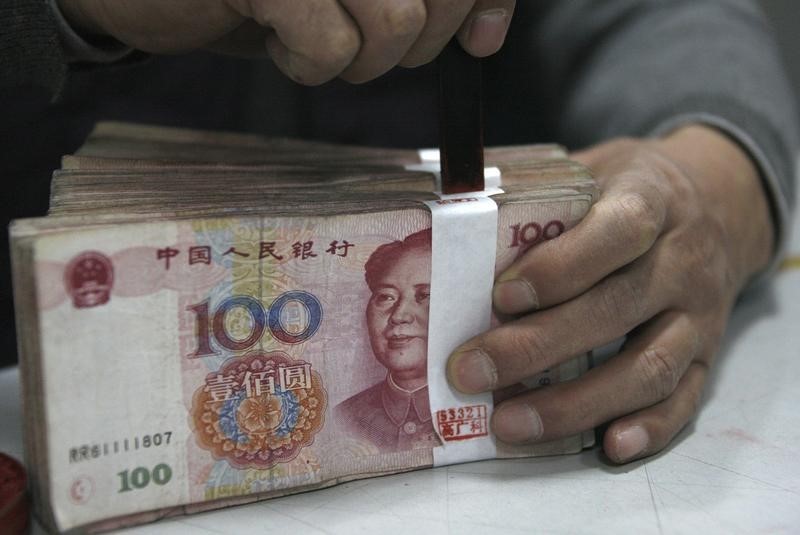By Engen Tham and Shu Zhang
SHANGHAI/BEIJING (Reuters) - China's vast network of "grey market" lenders have reaped big profits from lending money to individuals and companies to buy stocks, but as markets slump their customers face heavy losses after borrowing up to 10 times their starting capital.
Global investors are increasingly worried about the scale of leverage in China's stock market, fearing the impact of a crash on the ordinary retail investors who dominate it could destabilize the world's second biggest economy just as growth is slowing.
The risks have been magnified by the grey or shadow market - a network of state-owned commercial banks, trust companies, fund managers, and loosely regulated grassroots finance firms.
This financing, which can carry annualised interest rates of up to 17 percent, was the financial rocket fuel that powered a 110 percent gain in Shanghai stocks between November and early June, by allowing borrowers to substantially leverage their capital.
These firms continue to benefit from interest payments and fees, even as more than $2.5 trillion has been wiped from China's market capitalization over the last four weeks.
Excessive leverage can be lethal in stock markets, because as overextended borrowers sell shares to meet "margin calls" they drive prices down further, creating a vicious cycle.
Light regulation of shadow lending underscores Beijing's quandary as it looks to both protect the army of mom and pop investors, who comprise 80 percent of the stock market, while supporting a rally that has helped raise more than $63 billion from primary and secondary equity sales in China and Hong Kong this year alone.
"This needs to be controlled," said Jiahe Chen, chief strategist at Cinda Securities, adding that when markets were falling high leverage could create a domino effect.
GREY NETWORK
China's grey financing network involves a loose association of commercial banks, including the largest five state-owned lenders, smaller commercial banks, trust companies and an endless variety of self-styled stock matching endowment firms.
These finance firms, many of which were founded in the last year, often have backing from government enterprises but operate outside the remit of China's securities or banking regulators.
Calculating the size of the market is tricky, bankers say, due to its loose regulation. Total margin debt at brokerages stood at 2.2 trillion yuan in late June, but the amount of grey market leverage may exceed that amount.
For China's trust companies alone, stock assets increased by 225 billion yuan ($36 billion) from the previous quarter in the first three months this year, reaching 777 billion yuan by March 31, according to China Trust Association data.
That helped drive a 33 percent year-on-year gain in total profit for China's 68 trust firms in the first quarter of 2015.
Typically, banks cooperate with trust firms and stock matching endowment companies to raise cash by issuing wealth management products (WMPs) that are sold to banking clients.
These products generate funds that are then used to finance individual and corporate stock market investors at ratios of up to 1:10, according to executives familiar with the businesses.
The arrangement highlights a persistent faultline running through China's financial system, despite Beijing's efforts to regulate the shadow system - people buying WMPs through mainstream banks may be, knowingly or not, left highly exposed to the vagaries of the stock market.
Trust companies have also used such products to back real estate loans, corporate junk bonds and short-term over-the-counter debt instruments.
"Riskier clients go to trust companies because they can't get loans from banks," said Edmond Law, banks analyst at UOB Kay Hian (Hong Kong) Ltd, adding that investors in trust products backed by lending to these clients were at higher risk.
"GOOD MONEY FOR NOTHING"
The financing firms limit their own risk by requiring investors to add cash or sell shares once their accounts lose anywhere from 50 to 70 percent of their original investment value, executives said.
Two large and two smaller trust firms told Reuters that large state-owned banks such as Bank of China Ltd (BoC) (SS:601988) (HK:3988) and Bank of Communications Co (BoCom) Ltd (SS:601328) (HK:3328), as well many smaller lenders, indirectly channel money into the stock market this way.
"Banks are making good money for nothing," said an executive at a Shenzhen-based stock-matching endowment firm. His firm, a subsidiary of a central-government owned state enterprise, raises funds by selling WMPs through Bank of China.
It works like this: BoC raises 40 million yuan by selling the WMP to its clients, after a stock matching firm provides 20 million yuan in collateral. That creates a 60 million yuan pool that the stock matching firm can use to sell leverage to its customers.
BoC charges 10 percent annualised interest for such products, allowing the stock matching firm the opportunity to earn as much as 5 percent, based on the 15 percent annualised interest it charges clients.
Using trust firms as conduits, banks also invest money in funds that pile capital directly into stock markets, according to banking executives familiar with the situation.
BoC and BoCom declined to comment when contacted by Reuters.
A mid-level banker with one of the top five state-owned banks said that lending to trust companies involved very little risk to lenders themselves, as agreements were structured so banks are paid first if the markets tank.
"There are things that banks can't do directly because of risk to asset quality or reputation," he said. "So we use trusts as channels."
($1 = 6.2047 Chinese yuan renminbi)
